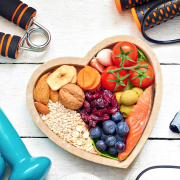Since losing weight is so important to so many people it’s sometimes hard to believe that there are thin people with an ever so unique goal of gaining weight. And if you have a strong desire to gain weight, you may feel inclined to terminate exercise completely while eating haphazardly.
This will surely do you more harm than good in the long-term.
When attempting to gain weight, it’s best to implement a slow and steady approach so as not to pose any risks to your health. You can best accomplish this by altering your eating habits in a healthy way while minimizing the amount of calories you burn during exercise. Here are seven great strategies for doing this.
Increase your daily calorie intake.
If you consume an excess of 3,500 calories over a given period of time, a calorie surplus occurs and you will gain one pound. To gain 1-2 pounds in a week, take in an extra 500-1,000 calories per day. These calories should come from nutritious foods that are high in essential micronutrients (vitamins and minerals).
Related Article: Estimating Your Metabolic Rate and Daily Calorie Needs
Consume high-quality carbohydrates.
You can greatly boost your weight gain by consuming extra portions of “good” carbohydrates in the forms of whole grain breads and cereals, legumes, vegetables, and fruits. This is an effortless strategy that can be implemented simply by eating an additional 2-3 servings of oatmeal, whole wheat bread, wild rice, beans, sweet potatoes, carrots, berries, and apples every day.
Related Article: Good Carbs Versus Bad Carbs: What You Need to Know About Carbohydrates
Load up on high-quality protein.
For healthy weight gain, add at least one additional serving of protein to every meal. When it comes to choosing your protein sources, unbattered fish, skinless poultry, lean meats, and low-fat dairy products are best as these are relatively low in saturated fat. However, make an effort to avoid consuming more than two 3-4 ounce servings of meat and three servings of low-fat dairy each day.
Related Article: Nutrition Basics: Your Daily Protein Intake
Regularly engage in resistance training.
Performing at least 2-3 days of resistance (weight) training each week will help you gain weight as muscle, rather than fat. Focus on exercises that target all the major muscle groups including your chest, back, shoulders, triceps, biceps, legs, and abdominals. For maximum results, perform at least 3-4 sets of each exercise using weights that fatigue your muscles within 6-10 repetitions.
Related Article: Weight Training 101: What You Need To Know Before You Lift
Eat fats but choose them wisely.
Consuming certain fats carries added health risks (high cholesterol), namely artificial trans fats. Eating foods rich in these fats will also lead weight gain as fat rather than muscle. When choosing fats opt for monounsaturated and polyunsaturated (omega-3) fatty acids, which can be found in avocado, nuts and seeds (walnuts, almonds and flaxseeds), olive oil, and oily fish (tuna, sardines, and salmon).
Simply add a serving or two of such foods every day to promote healthy weight gain.
Related Article: How Pescatarian Diets Can Be Good for Your Health
Avoid excessive amounts of cardio exercise.
Cardiovascular (cardio) exercises like jogging, bicycling, and swimming can burn an average of 500 calories per hour. If you burn 3,500 calories over a given period of time with cardio, a calorie deficit occurs and you will lose one pound. This is counterproductive if you’re trying to gain weight. To reduce the likelihood of a calorie deficit, minimize your cardio to no more than 30 minutes a day, three days per week.
Related Article: How to Perform Cardio Exercise the Right Way
Do not skip any meals.
Skipping meals is a sure way to create a calorie deficit, which can greatly hinder your progress towards weight gain. In the event that missing a meal is inevitable, keep a good supply of high-quality sports drinks, shakes, or supplements that contain at least 60-65% carbohydrates as well as significant quantities of protein, vitamins, and minerals.
Related Article: 3 Tasty Ideas for Incredibly Nutritious Meal-Replacement Smoothies
Although weight gain requires significant increases in your daily calorie consumption, there is no reason why you should compromise your nutrition and health while doing so. Following these quick and easy tips is a sure way to gain weight without the added health problems associated with poor nutrition and physical inactivity.







